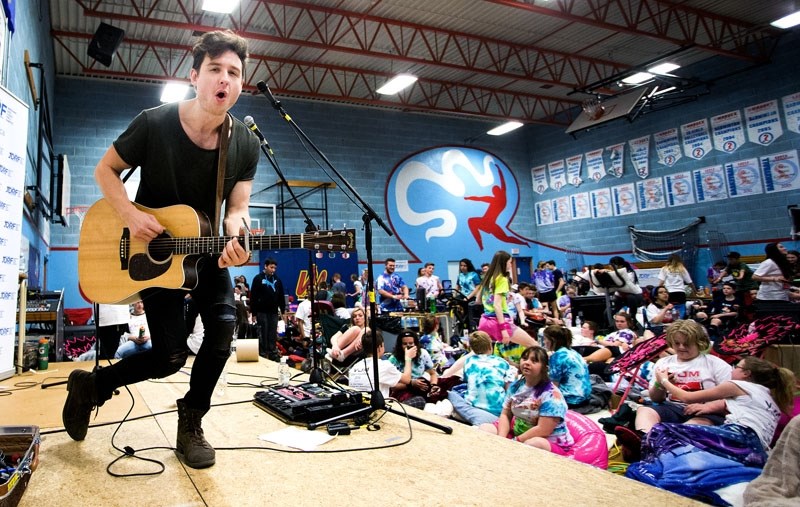Grade 9 student Jordan Thom has to stick himself with needles four times a day to survive.
He’s got Type 1 diabetes, and spoke to about 300 of his fellow students at Vincent J. Maloney Junior High this week who were working to find a cure for it.
“Sometimes I wonder what life would be like without diabetes, and with you guys’ fundraising and support, hopefully kids my age will have that opportunity in the future,” he told a packed gymnasium.
Thom, 15, was one of the many students at VJM who took part in the school’s fifth annual Cyclebetes fundraiser for Type 1 diabetes.
Cyclebetes is a national non-profit group that raises funds for JDRF (formerly known as the Juvenile Diabetes Research Foundation) to find a cure for Type 1 diabetes. In addition to a national bike relay, it also holds smaller school-based fundraisers similar to the Bellerose Bike-a-thon.
About 50 teams of six students each rode stationary bikes in the school’s gym for nine hours this week as part of the fundraiser, said Janelle Hobbs, co-organizer of the event. Many have been pumped up about the event since last fall.
“The event has really become part of the culture of the school.”
This year’s event raised some $47,000, Hobbs said – a bit less than the school’s goal of $50,000, likely a result of the state of the economy.
Cyclebetes has grown significantly from when it started five years ago, said Cheryl Vickers, fundraising and development co-ordinator for the JDRF in Edmonton and co-founder of the VJM Cyclebetes event. They started with just 25 bikes and $20,000 raised, and hit about 50 bikes and $56,000 last year.
“It’s been amazing what the students and staff have been able to do.”
VJM students spent the day spinning their wheels as the school’s Leadership class organized scavenger hunts, lip-sync battles, live bands, and arm-wrestling contests to keep them entertained. They also got to learn a lot about the nature of diabetes.
Type 1 diabetes is an autoimmune disorder where the pancreas ceases to produce insulin, Vickers said. It affects about 300,000 Canadians, and has no cure.
“It’s 24 hours a day, seven days a week. You don’t get a break.”
Unlike Type 2 diabetes (which is lifestyle-related), Type 1 diabetics rely on regular insulin shots to avoid lapsing into comas.
That made it hard to send her diabetic son, Turner, to school, said Vickers.
“You’re worried all the time about their highs and their lows,” she said, and wondering if there was something you did that caused your child to get the disease (she and her husband have no history with diabetes).
Managing the disease is also expensive – her son runs through about $500 in medical supplies a month.
Cash from events like this one go to fund clinical trials such as the ViaCyte encapsulation experiment in Edmonton, Vickers said. Run by James Shapiro (inventor of the famed Edmonton Protocol, which treats diabetes through use of islet cell injections), this experiment involves implanting islet cells encased in a protective pouch into a person’s body where they should produce insulin without triggering an autoimmune response. Should the experiment work, it would eliminate the need for insulin injections.
Thom said he hoped this fundraiser would raise awareness of Type 1 diabetes and contribute to a cure.
“I’ve gotten so used to it that it’d be pretty much the same (if they didn’t find one), but I’d like there to be a cure.”




